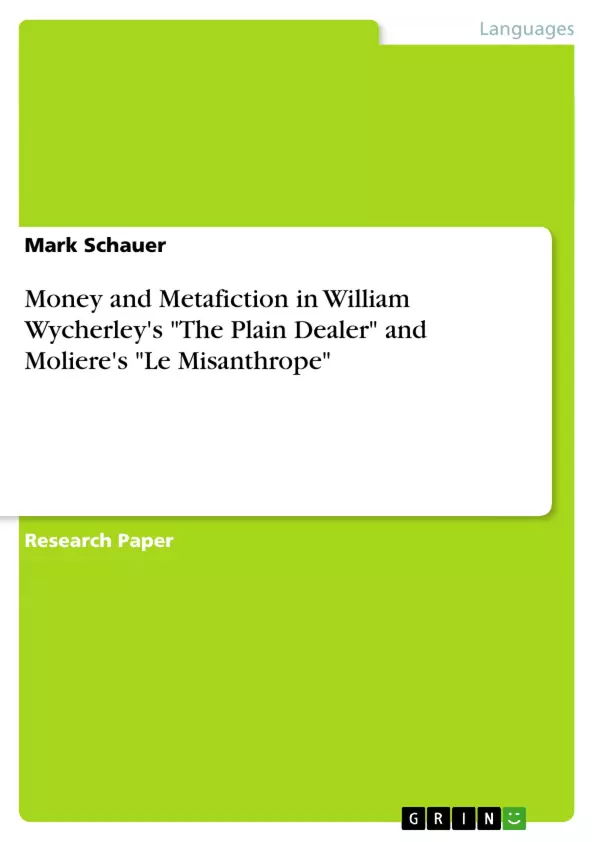That William Wycherley’s 1676 play The Plain Dealer is based upon his French contemporary Moliere’s Le Misanthrope from a decade earlier is a commonly accepted tenet among critics: Both Alceste in Le Misanthrope and Manly in The Plain Dealer display misanthropic tendencies. Both insist, however, that their misanthropy is not directed at all people, just those who dissemble and flatter in a hypocritical way. Both are initially in love with women who possess acid tongues in private, yet are guilty of exactly the same public flattery the men despise. Yet The Plain Dealer greatly exceeded its source material in popularity, at least during its initial stage run, and there is very little critical consideration as to why Wycherley’s play, which is generally considered the coarser of the two, outperformed its better. The relative success of Wycherley’s play can likely be attributed to the business concerns faced by Moliere that Wycherley was exempt from, the unvarnished, vulgar satire of The Plain Dealer that was informed by previous crowd-pleasing English plays, and The Plain Dealer’s much larger dollop of misogyny
Inhaltsverzeichnis (Table of Contents)
- Money and Metafiction: The Box Office Success of The Plain Dealer Over Le Misanthrope
- Moliere's Business and Stagecraft
- Metadrama and Misogyny in Wycherley's Play
- The Influence of Earlier English Plays on The Plain Dealer
- Comparing The Plain Dealer and Le Misanthrope: Style
- Comparing The Plain Dealer and Le Misanthrope: Action and Setting
- Moliere's Intentions for Le Misanthrope
Zielsetzung und Themenschwerpunkte (Objectives and Key Themes)
This paper analyzes the factors contributing to the greater box office success of William Wycherley's The Plain Dealer over its source material, Moliere's Le Misanthrope. It examines the differences in their historical contexts, playwriting styles, and theatrical elements, suggesting reasons for the disparity in their initial reception.
- The influence of commercial pressures and stagecraft on playwriting.
- The role of metadramatic references and satirical elements in audience engagement.
- The significance of misogyny and misanthropy in the plays' respective depictions of relationships and societal norms.
- The impact of stylistic choices, such as language and characterization, on audience reception.
- The evolution of critical and audience perceptions of both plays over time.
Zusammenfassung der Kapitel (Chapter Summaries)
- The first chapter establishes the context for the study by acknowledging the shared misanthropic themes of both plays but highlighting the disparity in their initial box office performance. It introduces the key arguments to be explored throughout the paper, focusing on the potential role of commercial pressures, satirical style, and misogyny in explaining this discrepancy.
- The second chapter examines the business concerns and stagecraft challenges faced by Moliere as a working playwright in contrast to the relative freedom enjoyed by Wycherley, a gentleman playwright. It discusses the time constraints and physical realities of Moliere's stage, highlighting the potential impact on audience reception.
- The third chapter analyzes the metadramatic elements within both plays, focusing on the more extensive and show-stopping references present in The Plain Dealer. It explores the way these references, particularly to The Country Wife, contribute to the play's satirical and bawdy tone.
- The fourth chapter examines the influence of earlier English plays on The Plain Dealer, highlighting its borrowings from plays like The Country Wife. It explores how these influences contributed to the play's ribald nature and popular appeal.
- The fifth chapter compares the style and characterization of both plays, focusing on the more exaggerated and satirical nature of The Plain Dealer. It analyzes the role of misogyny and misanthropy in each play, examining the distinct portrayal of female characters and the contrasting approaches to male protagonists.
- The sixth chapter compares the action and setting of the plays, highlighting the more dynamic and busy nature of The Plain Dealer in contrast to the more confined and introspective setting of Le Misanthrope. It explores the potential impact of these choices on audience engagement.
- The final chapter examines Moliere's potential intentions in writing Le Misanthrope, suggesting that he may have been aware of its commercial viability in a society that valued literary merit over theatrical success. It explores the contrasting reception of both plays over time, acknowledging the enduring legacy of Le Misanthrope.
Schlüsselwörter (Keywords)
This paper explores the key themes of metafiction, misogyny, theatrical style, and audience reception, focusing on the contrasting success of The Plain Dealer and Le Misanthrope. It examines the influence of commercial pressures, stagecraft limitations, and historical context on playwriting and performance. Key concepts include The Country Wife, Alexandrine meter, and the role of satire in shaping audience response. The study also analyzes the distinct portrayal of female characters and the contrasting approaches to misanthropy in both plays.
Frequently Asked Questions
Why was 'The Plain Dealer' more successful than 'Le Misanthrope' initially?
Its success is attributed to Wycherley's use of vulgar satire, metadramatic references to his own hits like 'The Country Wife', and a higher level of misogyny that appealed to English audiences.
What are the main similarities between the two plays?
Both feature misanthropic protagonists (Alceste and Manly) who despise hypocrisy and flattery, yet fall in love with women who exhibit those very traits.
How did commercial pressures affect Molière differently than Wycherley?
Molière was a working playwright facing strict business and stagecraft constraints, whereas Wycherley was a 'gentleman' playwright with more creative and social freedom.
What role does metadrama play in Wycherley's work?
Wycherley used 'show-stopping' references to his previous plays, creating a self-referential style that engaged the audience through shared cultural knowledge.
How do the settings of the two plays compare?
'The Plain Dealer' features a dynamic and busy action, while 'Le Misanthrope' is more confined and introspective, reflecting French classical preferences.
- Citar trabajo
- Mark Schauer (Autor), 2011, Money and Metafiction in William Wycherley's "The Plain Dealer" and Moliere's "Le Misanthrope", Múnich, GRIN Verlag, https://www.grin.com/document/230268



